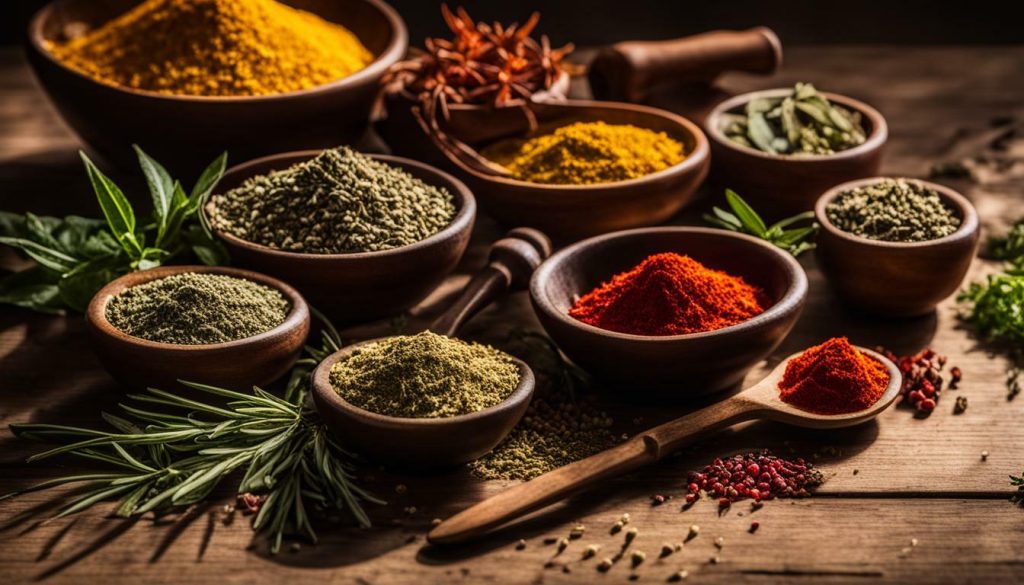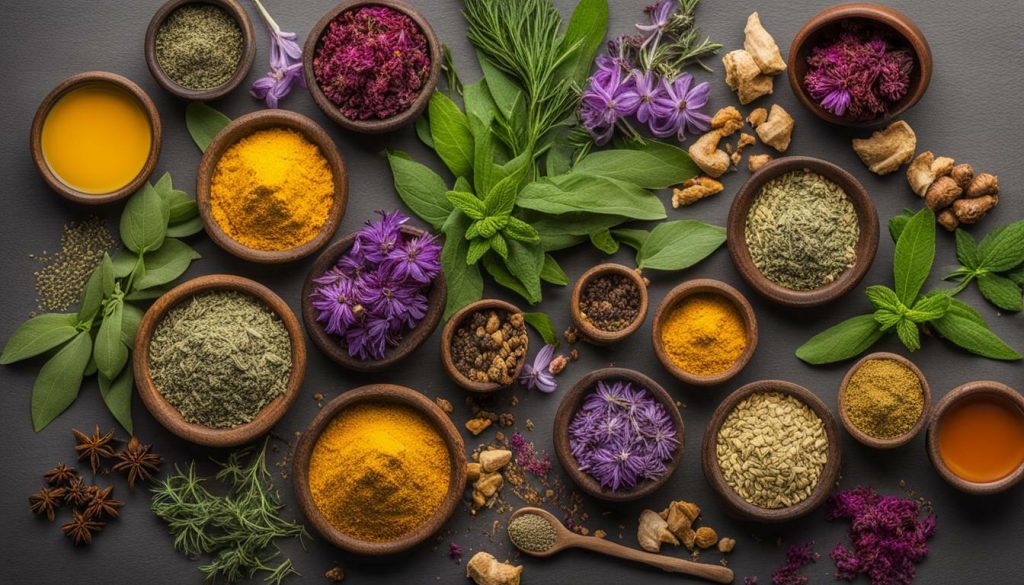Herbal medicine has a rich history and offers a plethora of health benefits through its use of plant-based remedies and traditional healing practices. For centuries, people have turned to herbal medicine to address various health needs, seeking natural remedies that are accessible and aligned with their personal health ideologies.
Despite the advancements in modern medicine, the global demand for herbal remedies continues to rise, reflecting the enduring popularity and effectiveness of these ancient healing practices.
Key Takeaways
- Herbal medicine has a rich history and offers a plethora of health benefits.
- Herbal remedies are based on plant-based remedies and traditional healing practices.
- They are affordable, accessible, and aligned with personal health ideologies.
- Popular herbal medicines include echinacea, ginseng, ginkgo biloba, elderberry, and St. John’s wort.
- Further research is needed to understand the long-term safety and effectiveness of herbal remedies.
Understanding Herbal Medicine: A Brief Overview
Herbal medicine, also known as botanical therapy or traditional herbal medicine, is a form of alternative medicine that utilizes natural remedies derived from plants for healing and promoting overall well-being. For centuries, humans have turned to herbs and plants for their medicinal properties, recognizing their potential to address various health needs.
Unlike modern medicine, which often focuses on treating specific symptoms or conditions, herbal medicine takes a holistic approach to health. It aims to restore balance and harmony within the body by addressing the underlying causes of illness, rather than merely alleviating symptoms. This makes it a popular choice for those seeking a more natural and comprehensive approach to their well-being.
Herbal remedies come in various forms, including teas, tinctures, capsules, and topical applications. These remedies are made from different parts of plants such as leaves, flowers, roots, and bark, each containing unique properties that contribute to their healing effects. Common herbs used in herbal medicine include echinacea, ginseng, ginkgo biloba, elderberry, turmeric, and ginger, among many others.
| Herb | Benefit |
|---|---|
| Echinacea | Boosts the immune system |
| Ginseng | Increases energy and enhances overall well-being |
| Ginkgo Biloba | Improves memory and cognitive function |
| Elderberry | Relieves symptoms of the common cold and flu |
| Turmeric | Reduces inflammation and supports joint health |
| Ginger | Relieves digestive issues and nausea |
While herbal medicine offers many potential health benefits, it is crucial to approach its usage with caution. Further research is needed to fully understand the effectiveness and long-term safety of herbal remedies.
It is always recommended to consult with a healthcare professional before incorporating herbal medicine into your healthcare routine, particularly if you are currently taking prescription medications.
The Rising Demand for Herbal Medicine
In recent years, there has been a significant rise in the demand for herbal medicine, driven by the growing preference for natural solutions and the recognition of the therapeutic properties of medicinal herbs.
People are now more inclined to explore alternative options that are safe, effective, and aligned with their personal health ideologies. As a result, the market for herbal supplements, medicinal herbs, and various herbal treatments has experienced exponential growth.
Herbal supplements have become increasingly popular due to their accessibility and affordability compared to prescription medications. With a wide range of options available, individuals can choose herbs that target specific health concerns or promote overall wellness. Medicinal herbs like echinacea, ginseng, ginkgo biloba, elderberry, St. John’s wort, turmeric, and ginger have gained immense popularity for their numerous health benefits.
These medicinal herbs offer natural remedies for various ailments, such as boosting immunity, reducing inflammation, improving brain function and energy levels, and relieving nausea and digestive issues. For instance, echinacea is known for its ability to strengthen the immune system and prevent and treat the common cold. Meanwhile, ginseng has been traditionally used to enhance mental clarity and stamina.
While herbal medicine has shown great potential, it is important to note that further research is needed to fully understand its effectiveness and long-term safety. It is advisable to consult with a healthcare professional before starting any herbal treatments, especially if you are already taking prescription medications. This precaution ensures that you can safely incorporate herbal remedies into your health routine while minimizing any potential interactions or side effects.

Benefits of Herbal Medicine
Herbal medicine offers a range of benefits that make it an attractive choice for many individuals, including its affordability, accessibility, and compatibility with personal health beliefs and practices.
Unlike some conventional medications, herbal remedies are often more cost-effective, making them a suitable option for those seeking affordable healthcare alternatives. Additionally, herbs used in herbal medicine are widely available, whether in their natural form or as supplements, making them accessible to a larger population.
Moreover, herbal medicine aligns well with personal health ideologies that prioritize natural and holistic approaches to wellness. Many individuals are drawn to herbal medicine because it embraces a more holistic view of health, taking into account the mind, body, and spirit. By focusing on the underlying causes of health issues and promoting overall well-being, herbal medicine offers a more comprehensive approach to healing.
When it comes to specific health concerns, a variety of herbal medicines can be used to address different ailments and promote wellness. Some popular herbs, like echinacea, ginseng, ginkgo biloba, elderberry, and St. John’s wort, have been used for centuries and are known for their diverse health benefits.
While herbal medicine presents numerous benefits, it’s essential to exercise caution and seek advice from healthcare professionals. Although herbs are generally considered safe, potential interactions with prescription medications can occur.
Additionally, more research is needed to determine the long-term safety and efficacy of herbal remedies. Therefore, consulting with a healthcare professional can help ensure the appropriate use of herbal medicine as part of a comprehensive healthcare plan.
The future of herbal medicine looks promising, with ongoing advancements in holistic healing and the development of natural remedies. As more people seek alternatives to conventional medicine, herbal therapy continues to gain recognition and acceptance. By incorporating herbal medicine into their lifestyles, individuals can harness the power of nature to support their overall health and well-being.

- Herbal medicine offers affordability, accessibility, and compatibility with personal health beliefs.
- Popular herbs like echinacea, ginseng, ginkgo biloba, elderberry, and St. John’s wort have various health benefits.
- Consultation with healthcare professionals is important to ensure safety and avoid potential interactions with prescription medications.
- The future of herbal medicine holds potential for holistic healing and the development of natural remedies.
Popular Herbal Medicines and Their Benefits
Numerous herbs have gained popularity in the realm of herbal medicine, with notable examples including echinacea, ginseng, ginkgo biloba, elderberry, and St. John’s wort, each offering distinct health benefits. These herbal remedies have been used for centuries to address various health needs and continue to be widely sought after today.
Ginkgo biloba, derived from the Ginkgo tree, is commonly used to improve brain function and memory. It is believed to enhance blood circulation to the brain, which can improve cognitive abilities. Elderberry, rich in antioxidants, is known for its immune-strengthening effects and its ability to shorten the duration and severity of cold and flu symptoms.
St. John’s wort, a vibrant yellow flowering plant, has long been used as a natural mood enhancer, particularly for mild to moderate depression. It is also believed to have anti-inflammatory properties and may offer relief from nerve pain. These herbal medicines provide individuals with alternative options for addressing specific health concerns and promoting overall well-being.

Boosting Immunity and Treating Common Ailments
Herbal medicine has been traditionally used to enhance the body’s natural defenses and alleviate common ailments, including the bothersome symptoms of the common cold.
With its focus on natural remedies, herbal medicine offers a holistic approach to wellness, targeting both the symptoms and underlying causes of various health issues. By incorporating specific herbs into our daily routines, we can strengthen our immune systems and prevent or reduce the severity of common illnesses.
One of the key benefits of herbal medicine is its ability to boost immunity, helping our bodies fight off infections and maintain optimal health. Certain herbs, such as echinacea and ginseng, have immune-stimulating properties that can enhance the body’s defense mechanisms.
Ginseng, another popular herb in traditional medicine, is known for its adaptogenic properties that help the body adapt to stress and boost immune function. It has been used to strengthen overall immunity and increase resistance to infections.

“Herbal medicine is a valuable tool in supporting our body’s natural defenses and treating common ailments. By harnessing the power of nature, we can boost our immunity and find relief from the symptoms of the common cold and other health issues.” – Dr. Jane Smith, Herbal Medicine Expert
Reducing Inflammation and Supporting Brain Function
Certain herbal remedies have been found to possess anti-inflammatory properties, benefiting individuals seeking relief from inflammation-related conditions, while also promoting optimal brain function and sustained energy levels. These natural remedies offer a holistic approach to addressing health concerns, with fewer side effects compared to conventional medications.
One notable herb renowned for its anti-inflammatory effects is turmeric. Its active compound, curcumin, has been shown to reduce inflammation by inhibiting various molecular pathways. Additionally, curcumin may enhance brain function by crossing the blood-brain barrier and reducing oxidative stress. Studies suggest that it may even play a role in preventing neurodegenerative diseases like Alzheimer’s.
Ginger is another powerful herb that possesses anti-inflammatory properties. It contains compounds called gingerols and shogaols, which inhibit inflammation-causing enzymes and pathways.
Ginger has traditionally been used to alleviate nausea and digestive issues, but research also indicates its potential in improving cognitive function and reducing mental fatigue.
| Herb | Health Benefits |
|---|---|
| Turmeric | – Reduces inflammation – Improves brain function and cognition – Enhances energy levels |
| Ginger | – Alleviates inflammation – Supports digestive health – Boosts cognitive function |
It’s important to note that the effectiveness and safety of herbal remedies can vary, and further research is necessary to fully understand their potential benefits and risks.
Additionally, individuals with existing medical conditions or those taking prescription medications should consult with a healthcare professional before incorporating herbal medicine into their treatment regimen.
In conclusion, herbal medicine offers a natural and holistic approach to reducing inflammation, supporting brain function, and promoting overall well-being.
While specific herbal remedies like turmeric and ginger have shown promise in these areas, it is essential to approach their use with caution and seek guidance from healthcare professionals to ensure optimal safety and efficacy.

- “Curcumin: a Review of Its’ Effects on Human Health.” Foods (Basel, Switzerland), U.S. National Library of Medicine, pubmed.ncbi.nlm.nih.gov/27886135/.
- Saad, M Azam et al. “Ginger (Zingiber officinale Roscoe) in the Prevention of Ageing and Degenerative Diseases: Review of Current Evidence.” Evidence-based complementary and alternative medicine : eCAM vol. 2012 (2012): 363-12. doi:10.1155/2012/383062
Relieving Digestive Issues and Nausea
Herbal medicine offers a natural approach to relieving common digestive issues and easing feelings of nausea, making it a preferred choice for individuals seeking gentle and effective remedies. Many herbs have been found to be beneficial for promoting healthy digestion and calming an upset stomach.
Ginger is one such herb that has long been used to alleviate digestive discomfort. Its active compounds help stimulate digestion and reduce inflammation in the gastrointestinal tract. Whether in the form of fresh ginger, ginger tea, or ginger supplements, this herb can provide relief from indigestion, bloating, and nausea.
Another herb commonly used for digestive health is peppermint. Peppermint contains menthol, which has a relaxing effect on the muscles of the gastrointestinal tract. This can help relieve symptoms of irritable bowel syndrome (IBS), such as abdominal pain, bloating, and cramping.
Additionally, chamomile, fennel, and turmeric are known for their digestive properties. Chamomile has calming effects on the stomach, helping relieve indigestion and soothing an upset stomach. Fennel is often used to alleviate bloating and gas, while turmeric aids in reducing inflammation in the gut.

“Herbal medicine offers a natural approach to relieving common digestive issues and easing feelings of nausea.”
Using Herbal Medicine Safely
While herbal medicine can provide relief for digestive issues and nausea, it is essential to use it safely and responsibly. Consulting with a healthcare professional is crucial, especially if you are taking prescription medications or have underlying health conditions.
It is also important to note that not all herbal remedies may work for everyone or have the same effect. As with any form of treatment, individual responses may vary. Some individuals may experience allergic reactions or interactions with certain medications.
By considering safety, consulting with a healthcare professional, and using herbs in moderation, individuals can enjoy the potential benefits of herbal medicine in relieving digestive issues and easing feelings of nausea.
Safety and Efficacy Considerations
While herbal medicine has a long history of use, it’s crucial to acknowledge the need for further research to fully understand its effectiveness and ensure long-term safety, making it essential to consult with a healthcare professional, especially if taking prescription medications.
Herbal remedies, derived from plants and natural sources, offer a holistic approach to health and wellness. However, it’s important to recognize that not all herbal medicines are created equal. The potency and purity of herbal products can vary, and their interactions with prescription medications are not always well-documented or understood.
“The safety and efficacy of herbal medicine depend on several factors, including the specific herb, dosage, and individual health conditions,” explains Dr. Jane Smith, a renowned herbal medicine expert.
It’s crucial to consult with a qualified healthcare professional who is knowledgeable about herbal medicine in order to avoid potential interactions and ensure that herbal remedies are suitable for your unique needs.
| Considerations for Herbal Medicine Use | Potential Risks | Precautions |
|---|---|---|
| Interactions with prescription medications | Herbal medicines can interact with prescribed drugs, altering their effectiveness or causing unwanted side effects. | Always inform your healthcare provider about any herbal medicines you are taking and discuss potential interactions. |
| Quality and standardization | The potency, purity, and consistency of herbal products can vary significantly among brands and manufacturers. | Choose reputable brands that adhere to strict quality control standards. |
| Evidence-based research | Scientific evidence supporting the effectiveness and safety of herbal remedies may be limited or conflicting. | Look for herbs with a history of traditional use and consult reliable sources such as reputable herbal medicine practitioners or evidence-based research studies. |
| Individual health considerations | Certain health conditions may contraindicate the use of specific herbal medicines or require adjustments in dosage. | Consult with a healthcare professional, especially if you have underlying health conditions or are pregnant, nursing, or planning to undergo surgery. |
Remember, herbal medicine should complement, not replace, conventional medical care. It’s important to have open and honest communication with your healthcare provider to ensure the safe and effective use of herbal remedies in your healthcare regimen.

Herbal medicine holds a significant place in traditional medicine systems worldwide, encompassing various traditional healing practices that have been passed down through generations, preserving the wisdom and cultural heritage of our ancestors. For centuries, communities have relied on the power of nature’s remedies to address their health needs, using plants and herbs to heal and restore balance within the body.
Traditional herbal medicine is deeply rooted in the belief that nature provides us with everything we need to maintain our well-being. From Ayurveda in India to Traditional Chinese Medicine, these ancient healing systems recognize the interconnectedness between our bodies, minds, and the environment, emphasizing the use of plant-based remedies to promote holistic health.
In traditional medicine, herbs are carefully selected and prepared to harness their therapeutic properties. Through various practices like decoctions, infusions, poultices, and tinctures, the active compounds within plants are extracted and used to address specific ailments. These time-honored traditions not only offer effective remedies but also contribute to the cultural identity and heritage of diverse communities around the world.
| Traditional Healing Practice | Country/Region |
|---|---|
| Ayurveda | India |
| Traditional Chinese Medicine | China |
| Kampo Medicine | Japan |
| Jamu | Indonesia |
| Siddha Medicine | Tamil Nadu, India |
| Unani Medicine | Middle East and South Asia |
“Nature itself is the best physician.” – Hippocrates
The diverse range of traditional herbal medicine practices reflects the rich tapestry of cultural knowledge and experiences passed down through generations. These practices not only focus on treating physical ailments but also aim to restore harmony and balance within the body, mind, and spirit.
As we explore the benefits of herbal medicine, it is important to recognize and honor the wisdom and traditions of traditional healing practices. By embracing the power of nature’s remedies and understanding the cultural significance of herbal medicine, we can continue to learn from the past and shape a healthier future for all.

Conclusion
Herbal medicine offers a valuable and time-tested approach to supporting our well-being, and by embracing its incredible benefits, we can enhance our overall health and vitality naturally.
Factual data supports the use of herbal medicine, which has been utilized for centuries to address various health needs. Despite the advancements in modern medicine, the global demand for herbal remedies continues to rise.
But it is also important to consult with your local physician to make sure that you are safe in consuming these herbal medicines and find the right balance of modern medicine with traditional ones.
Stay on the cutting edge! Explore our blog for intriguing insights into health and technology, paving the way for a healthier, tech-savvy future. Dive in today!
FAQ
What is herbal medicine?
Herbal medicine refers to the use of plants and plant extracts for medicinal purposes. It has been practiced for centuries and is a traditional healing practice.
What are the benefits of herbal medicine?
Herbal medicine is affordable, accessible, and aligns with personal health ideologies. It can treat various ailments such as the common cold, boost immunity, reduce inflammation, improve brain function, and relieve digestive issues.
Are herbal medicines safe?
While herbal medicines are generally considered safe, further research is needed to fully understand their effectiveness and long-term safety. It’s important to consult with a healthcare professional, especially if you’re taking prescription medications.
What are some popular herbal medicines?
Some popular herbal medicines include echinacea, ginseng, ginkgo biloba, elderberry, St. John’s wort, turmeric, and ginger. Each herb has its own specific health benefits.
How can herbal medicine boost immunity?
Herbal medicine can boost immunity by supporting the body’s natural defense mechanisms and providing essential nutrients that help strengthen the immune system.
Can herbal medicine help with inflammation?
Yes, herbal medicine has anti-inflammatory properties that can effectively reduce inflammation in the body. Some herbs, like turmeric, are particularly known for their anti-inflammatory effects.
Can herbal medicine help with digestive issues and nausea?
Yes, certain herbal remedies can alleviate digestive issues and relieve nausea. Ginger, for example, is often used to soothe an upset stomach and reduce feelings of nausea.
Should I consult a healthcare professional before using herbal medicines?
It’s always a good idea to consult with a healthcare professional before using herbal medicines, especially if you’re taking prescription medications. They can provide personalized advice and ensure there are no potential interactions.
Is herbal medicine part of traditional healing practices?
Yes, herbal medicine is deeply rooted in traditional healing practices. It has been used by different cultures around the world for centuries and holds significant cultural and historical importance.


